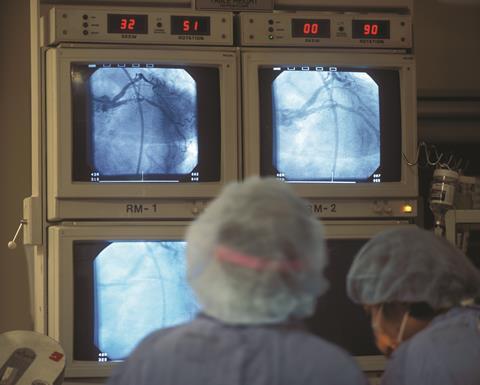South Tees and other NHS hospitals are turning to the independent sector to plug the gaps when services are overstretched. Catherine Blackledge reports

Theatre pressures: NHS trusts are looking to the independent sector to take on some elective operations
At the end of a bitterly cold January 2015, South Tees Hospitals Foundation Trust found that severe winter bed pressures and a technical breakdown in theatre had resulted in the cancellation of 100 elective operations.
‘They do not feel threatened by engaging with the independent sector; they see us as an extension of them’
The trust put in a call to the independent BMI Woodlands Hospital to ask if it could help with its capacity problem and prevent orthopaedic elective surgeries from being cancelled. The answer – via “spot purchase”, an arrangement that enables procurement of services as needed – was yes, and the first patients were seen days later.
This scenario is not unusual, says Debbie Dobbs, executive director of BMI Healthcare’s Woodlands Hospital in Darlington, County Durham. Over the last eight years bar one, which was a very mild winter, spot purchase of BMI Woodlands’s services has helped ease local NHS capacity pressures.
It doesn’t always mean opening up theatres on a Sunday – as they did for South Tees – but as the 38-bed hospital is typically running at full capacity (70 per cent of which is NHS activity), it often does.
- Transformation: Supporting chance
- Transformational case studies: Point and click
- Health inequalities: A tale of neglect
Spot purchase also operates in a more planned manner. Knowing her local NHS management team is beginning its gap analysis for 2015-16, Ms Dobbs will be involved early in the planning phase. “We are in constant contact with trusts at the divisional level,” she say. “We sit down with the director of operations and chief financial officer and discuss where gaps are and what we can do to help.”
If that means opening every Sunday and running dual lists, that is what they do. At the moment, they deliver around 500 orthopaedic spot purchases a year and are working with County Durham and Darlington Foundation trust, as well as South Tees.
‘We try to keep the patients in the same pathway, seeing the same consultant’
Patient satisfaction is high. “We try to keep the patients in the same pathway, seeing the same consultant, and we have a dedicated NHS team in the hospital.” If a patient is with the same consultant and has already been assessed for surgery, BMI will do a review of that assessment, making sure it is in line with its own procedures.
The independent sector and the NHS working together in this way is highly beneficial, says Ms Dobbs. “From the patient perspective, it’s very important to be given the choice locally; from the local NHS point of view, with the pressures on them, it’s vital too.”
She adds: “We have got massive support from the NHS and we have a fantastic working relationship. They do not feel threatened by engaging with the independent sector; they see us as an extension of them.”
Difficult winters
Rakesh Marwaha, chief officer, NHS Erewash Clinical Commissioning Group, concurs. “The services of the independent sector are critical for the capacity we need to deliver the 18-week waiting time target. Working with the independent sector gives us the head room to do urgent care work. For example, this winter’s been particularly difficult: working with the independent sector we can continue to do our elective care work and patients can continue to be supported in their care.”
Mr Marwaha, who is on the board of NHS Clinical Commissioners, points to a change in recent years in the working relationship between the NHS and the independent sector. “Five or 10 years ago, there was a lot of scepticism about what the independent sector could do,” he says.
“What has become clear over time is trust that the independent sector will take on the more complex patients. We now have the understanding about what the independent sector can do. They are now part of the healthcare economy.”
He adds: “BMI Healthcare and others have spent time working with clinicians and ourselves to be part of the system. I know nationally the independent sector is very important as part of our overall capacity to deliver to patients. We have the same conversations with the independent sector as we do with local providers - it is all about looking at what is best for patients.”
At BMI Healthcare The Alexandra Hospital in Cheadle, Manchester, the passage of time and a developing understanding has also had an impact on the type of spot purchase work that the 140-bed hospital provides. As well as offering routine orthopaedics, it provides cardiac surgery, some cancer services, and complex urological, thoracic, spinal and gynaecological procedures as required.
‘If you have a pressure point on your patch, if there is capacity there, why can’t we work together?’
“As time has gone on,” says Sarah Agnew, The Alexandra Hospital’s director of operations, “the more confident the NHS feels with us, the more complex the work has become. They see us more as a partner now than they have ever done before.”
It is the needs of the NHS organisation, she says, that determines how they work together. Ms Agnew points to the cath lab at The Alexandra Hospital, which carries out cardiac ablations, stent work, 3D mapping of veins and aortas and fits pacemakers. “We do have pressures but there are areas of downtime,” she says. “The cath lab was operating at a 60 per cent utilisation rate.” She has worked with local trusts on this and patients from the University Hospital of South Manchester Foundation Trust are now benefiting from this spare capacity.
In cardiology, the hospital has been working closely with University Hospital of South Manchester since 2012 to ease capacity issues; similar work is underway with Central Manchester University Hospitals Foundation Trust and has just begun outside the Greater Manchester area with Sheffield Teaching Hospitals Foundation Trust. Overall, it delivers around 350 spot purchase procedures a year.
Ms Agnew also highlights how BMI Healthcare’s The South Cheshire Hospital in Crewe found a novel way of working with its neighbour, Mid Cheshire Hospitals Foundation Trust. A covered corridor joins the two sites, and when Mid Cheshire was experiencing a shortage of post-operative beds, a spot purchase arrangement enabled patients to be operated on in the NHS facility and transferred via the corridor to receive post-operative care from BMI’s The South Cheshire.
Increasing use of services
“The NHS is using our services more and more,” says Ms Agnew. “We can assist them. We are a commercial organisation, but we are there to deliver a service for the patient. It is an overall benefit to the health economy.”
‘If there is capacity there [in the independent sector], why can’t we work together?’
Ms Dobbs’ advice for others working this way is to make sure communication channels are clear. “For us,” she says, “the only hurdles were around good communication between the NHS and ourselves. We just pick up the phone.”
She underlines the relationship her hospital has with the local commissioners and has a message for others. “For those areas where commissioners feel the independent sector can’t play a part, go and see. If you have a pressure point on your patch, if there is capacity there [in the independent sector], why can’t we work together? Forge the links, see what is on offer. It does not make sense for patients to be cancelled and cancelled and cancelled when local capacity is available.”
Jan Thomas on capacity
For most NHS commissioners, elective care capacity has been at the front of their minds for some time due to the need to comply with the 18-week waiting time target.
It is often said that the more you have the more you use, but we all know that the demands being placed on the care system are not reducing. So how do you balance capacity and demand whilst always prioritising quality?

The NHS is driven by routine and demand, agreed work plans, limited resources and the need to balance elective and urgent care. Elective care can be planned, but with the knock-on effect from cancellations due to emergencies, together we need to start developing a flex and fix process; a “campus of care” approach.
This means knowing the capacity for urgent care, for patients fit for discharge, and also system-wide theatre and bed capacity in other hospital settings.
At BMI Healthcare we have availability of both people and facilities, such as high dependency units, diagnostics and imaging services.
Evening and weekend working with a focus on effectiveness and efficiency means that we can provide flexibility to support an elective care campus.
In this “campus” approach, maximising available capacity needs to be balanced with patient choice. We all understand that the relationship that a patient develops during their first encounter creates a level of trust with their clinician, sometimes meaning that patients will often choose to wait longer to continue their care with that clinician.
By working in partnership, we are able to use our flexibility to meet the patient’s choice of clinician regardless of the environment. For example, often we will work in partnership with a trust which would have cancelled patient lists but instead the NHS surgical/theatre team have used our theatre and bed capacity.
When demand is rising and capacity is tight, we need to work together across the whole system capacity to ensure patients receive the professional care they need, when they need it. Teamwork is the key.
Jan Thomas is NHS commercial director of BMI Healthcare
Topics
- BMI Healthcare
- Commissioning
- COUNTY DURHAM AND DARLINGTON NHS FOUNDATION TRUST
- East Midlands
- Independent providers
- MID CHESHIRE HOSPITALS NHS FOUNDATION TRUST
- NHS Erewash CCG
- North East
- REGIONS
- South Tees Hospitals NHS Foundation Trust
- UNIVERSITY HOSPITAL OF SOUTH MANCHESTER NHS FOUNDATION TRUST
- Winter pressures
Commissioning supplement: At the heart of the new NHS

Shaping transformation
- 1
- 2
- 3
- 4
 Currently
reading
Currently
reading
Commissioning supplement: External providers can lend a hand


































No comments yet